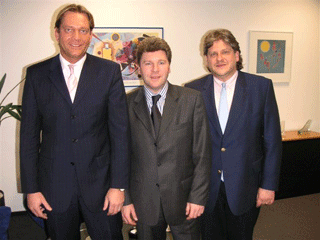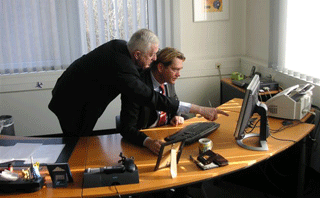 New
Lyric To A Familiar Tune New
Lyric To A Familiar Tune
Pierre
Brunet Will Change GSA Landscape Forever

Entrepreneur and air cargo visionary Pierre Brunet (center) with Ingo
Zimmer, (left) and Daniel Graf (right) in the ATC office at Frankfurt
Airport.
“Play it again”
The words Bogie snaps at Sam the pianist
at Rick’s Place during the immortal 1942 film “Casablanca”,
followed by the tune “As Time Goes
By,” lifts the joint in a romantic interlude.
Here in Frankfurt, far away from the legendary
“Café Americain,” one Pierre Brunet is also about to
play it again.
A well-known and respected global player, Mr. Brunet built European Cargo
Services into a powerhouse during the late 1990’s.
Right now he is about nothing less than
reshaping the GSA business here, and maybe around the world while rounding
up some of the usual suspects into a new partnership.
Pierre Brunet, Daniel Graf and Ingo Zimmer
of ATC, ZRH and FRA, lend their voices as the story unfolds |
|
FlyingTypers:
We hear that you are forming a global company for Cargo General Sales
Agencies.
Pierre Brunet: That is correct.
I will elaborate a bit on why and how. In 1997 I spotted the GSA Cargo
business as kind of a single action and mostly local diversified enterprise.
Cooperation agreements were loose and there was not much structure and
organization in the trade. If you acquired one GSA you might have bought
one problem. Purchasing ten spread the risk.
If one business was bright and operated
aggressively you could make money, but on the flip side some GSA's were
open pits to very deep losses.
When I finally got into the GSA business
in 1998, it was too early to approach a worldwide consolidation, so I
founded ECS-European Cargo Services after
agreement with a handful of prosperous companies to pull forces together.
We put value on the widely unknown names
of GSA's.
The finance people actually did not understand
what it was we were doing and even questioned why airlines would outsource
part of their lucrative business.
ECS appeared on the stock market in 1998.
Our share was successful and I sold my 52
% to public/private equity funds in 2000.
FT: Didn’t you migrate
to Mauritius after 9/11?
PB:: Well, yes. Of course
9/11 changed the world – and especially the airline business. The
financial analysts had kept an eye on ECS and liked the results, so did
the shareholders.
By 2005 I was kind of challenged to review
the business that I know quite well again.
Everybody has been following the market
now more than ever before.
My earlier vision of global GSA has not
lost its charm.
Right now globalization is much more appropriate
than 1997.

Screen Gems. Air Cargo News Publisher Geoffrey Arend and
ATC Aviation Services Ingo Zimmer chart GSA development inside ATC Frankfurt
Cargo City South
FT: Post 9/11 airlines
were desperately looking for any kind of saving opportunity; we observed
a real boom in “going GSA” in cargo here in Europe.
PB: Well, you see, airlines
bundled in alliances becoming real global forces. Forwarders put their
shoulders together like American Football players, airports and handling
companies did the same.
But as carriers were willing to outsource
the entire cargo business in one big hurry, the finance people, especially
potential investors were very cautious and questioned what would happen
in Asia in the near future and in the Middle East as example.
I worked convincing the right people and
acted fast surfing the market finding bits and pieces here and there.
This time it was not “Europe”
any more.
The vision had to be “World, ”if
not “Universe”—as Daniel always insists.
The naming of the company was quite tricky
because of so many abbreviations being similar involving “W”
for World etc., so we tried to register maybe ten brands.
My favorite was to be abbreviated WFS but
that was also taken already.
Well here we are, WFC—“World
Freight Company.”
We started our cooperation with ATC in 2004.
The 2004 and 2005 results are good so that shareholders´ value improved
and we could go ahead.
I met a lot of GSA's and the question was
– and is, what is the best approach?
There are about 150 General Sales Agents
in the world dedicated to airfreight.
They vary a lot.
Good companies with bad airline-contracts,
mediocre companies with attractive mandate carriers.
We have to be extremely flexible and selective.
I believe that there will be three and a
half leading companies in this business in the future—the “half”
might be acting in a very specific individual market.
FT: So the local hero
of yesterday’s Cargo GSA is today’s role-player as consolidation
goes. Who do you see as being the future business leaders and where?
PB:
All this is going to be clear very soon. I think the major players
are going to control the business in the not too far future.
Four or five GSA's in Frankfurt, London, Paris and Amsterdam are going
to account about 70% of the tonnage moved.
Currently ECS is generating about EUR 200 million annually.
WFC is targeting EUR 250 million annual
turnover by mid 2006 and activity in 22 countries with EUR 300 million
throughput by end of this year.
By the end of March 2006 we will announce
the names of new GSA companies on board with WFC. The WFC target is ambitious.
In three years we want to generate between
EUR 400 and EUR 500 million and be a factor in 42 individual national
markets around the world.
FT: What is the added
value in your business? Who realizes the major share of the money being
pumping into the logistics supply chain by air shippers and consignees
around the world?
PB: The pumping is not enough
I think. There are a lot of tons but less revenues generated than two
years ago.
In terms of value added, our members will produce EUR 250 million by mid
2006 with only 200 to 300 people working in the companies.
This is a degree of productivity never reached
in an airline cargo organization. Of course the carriers benefit from
our efforts.
We employ the absolute state of the art
IT system covering all aspects of air cargo from sale and customer service
via booking; operation, delivery control, track and trace plus accounting.
FT: Last point. Can you
describe the budget and plans for building WFC? What is your philosophy?
PB: We have EUR 32 million
in equities for the establishment of the company plus agreements with
the respective banks to be backed up to EUR 85 million.
There are three phases planned:
End of March 2006–publication of member
GSA’s.
End of June—EUR 250 million annual
revenues.
End of 2006—revenues of EUR 300 million.
My philosophic thought is this vision and
the fact that I am determined to see WFC as market leader in sales, in
network coverage and maybe in tons also.
As we depart ATC, a cornerstone of the new Pierre Brunet venture, his
words uncommon and filled with excitement and ambition promise a new deal,
a change of the landscape in air cargo.
“You must remember this, a kiss is still a kiss,” plays softly
as the story unfolds.
(Guenter Mosler) |



